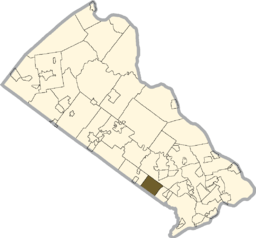Upper Southampton Township, Bucks County, Pennsylvania
| Upper Southampton Township | |
| Township | |
| Southampton Baptist Church and Cemetery, built 1772 | |
| Motto: "A nice place to live!" | |
| Country | United States |
|---|---|
| State | Pennsylvania |
| County | Bucks |
| Elevation | 249 ft (75.9 m) |
| Coordinates | 40°10′33″N 75°02′21″W / 40.17583°N 75.03917°WCoordinates: 40°10′33″N 75°02′21″W / 40.17583°N 75.03917°W |
| Area | 6.6 sq mi (17.1 km2) |
| - land | 6.6 sq mi (17 km2) |
| - water | 0.0 sq mi (0 km2), 0% |
| Population | 15,152 (2010) |
| Density | 2,384.5/sq mi (920.7/km2) |
| Timezone | EST (UTC-5) |
| - summer (DST) | EDT (UTC-4) |
| Area code | 215 |
 Location of Upper Southampton Township in Bucks County | |
|
Location of Upper Southampton Township in Pennsylvania | |
 Location of Pennsylvania in the United States | |
| Website: http://www.southamptonpa.com | |
Upper Southampton Township is a township in Bucks County, Pennsylvania, United States. The population was 15,152 at the 2010 census.
Geography
According to the United States Census Bureau, the township has a total area of 6.6 square miles (17.1 km²), all of it land.
Demographics
| Historical population | |||
|---|---|---|---|
| Census | Pop. | %± | |
| 1930 | 1,229 | — | |
| 1940 | 1,314 | 6.9% | |
| 1950 | 2,027 | 54.3% | |
| 1960 | 7,941 | 291.8% | |
| 1970 | 13,936 | 75.5% | |
| 1980 | 15,806 | 13.4% | |
| 1990 | 16,076 | 1.7% | |
| 2000 | 15,764 | −1.9% | |
| 2010 | 15,152 | −3.9% | |
| http://www.dvrpc.org/data/databull/rdb/db82/appedixa.xls. | |||
As of the 2010 census, the township was 95.8% White, 0.8% Black or African American, 0.1% Native American, 1.8% Asian, 0.1% Native Hawaiian, and 1.1% were two or more races. 1.6% of the population were of Hispanic or Latino ancestry .
As of the census[1] of 2000, there were 15,764 people, 6,031 households, and 4,462 families residing in the township. The population density was 2,384.5 people per square mile (920.8/km²). There were 6,123 housing units at an average density of 926.2/sq mi (357.7/km²). The racial makeup of the township was 96.87% White, 0.77% African American, 0.06% Native American, 1.50% Asian, 0.02% Pacific Islander, 0.19% from other races, and 0.58% from two or more races. Hispanic or Latino of any race were 0.81% of the population.
There were 6,031 households, out of which 27.8% had children under the age of 18 living with them, 64.5% were married couples living together, 6.8% had a female householder with no husband present, and 26.0% were non-families. 22.6% of all households were made up of individuals, and 12.7% had someone living alone who was 65 years of age or older. The average household size was 2.58 and the average family size was 3.05.
In the township the population was spread out, with 21.6% under the age of 18, 6.0% from 18 to 24, 25.7% from 25 to 44, 27.1% from 45 to 64, and 19.6% who were 65 years of age or older. The median age was 43 years. For every 100 females there were 92.9 males. For every 100 females age 18 and over, there were 88.5 males.
The median income for a household in the township was $59,493, and the median income for a family was $66,889. Males had a median income of $46,368 versus $33,118 for females. The per capita income for the township was $26,362. About 1.5% of families and 2.6% of the population were below the poverty line, including 3.1% of those under age 18 and 5.5% of those age 65 or over.
Passenger trains
Upper Southampton had two commuter rail stations until February 1983. Service was "temporarily" suspended due to a lack of ridership along the line. The train station has since been restored and is now a private residence. In the ensuing years (particularly post-1995), there has been interest in resuming passenger service by Bucks County officials; however, neighboring Montgomery County officials are staunchly opposed to it. Though rail service was initially replaced with a Fox Chase-Newtown shuttle bus, patronage remained light. The replacement bus service was far slower and less convenient than the train service it replaced, resulting in the shuttle bus being very unpopular. The travelling public never saw a bus service as a suitable replacement for a rail service.
References
- ↑ "American FactFinder". United States Census Bureau. Retrieved 2008-01-31.
